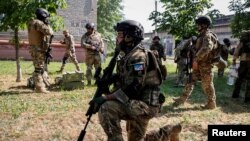Ukrainian Foreign Minister Dmytro Kuleba chastised French President Emmanuel Macron, who earlier urged world powers not to “humiliate" Russian President Vladimir Putin in Ukraine in order to preserve chances for a diplomatic solution to the conflict.
“Calls to avoid humiliation of Russia can only humiliate France and every other country that would call for it. Because it is Russia that humiliates itself,” Kuleba tweeted Saturday. “We all better focus on how to put Russia in its place. This will bring peace and save lives."
“We must not humiliate Russia so that the day when the fighting stops, we can build an exit ramp through diplomatic means,” Macron said in a Friday interview with regional media, adding that France would play a key mediating role.
“I think, and I have told him, that he has made a historic and fundamental mistake for his people, for himself and for history,” Macron said. “I think he isolated himself. Taking refuge in isolation is one thing, but finding a way out is a difficult thing.”
Macron has sought to maintain a dialogue with Russian President Putin since Moscow invaded Ukraine in February. His stance has been repeatedly criticized by some eastern and Baltic partners in Europe, as they see it as undermining efforts to pressure Putin to the negotiating table.
Macron has spoken with Putin regularly since the invasion as part of efforts to achieve a cease-fire and begin a credible negotiation between Kyiv and Moscow.
France has supported Ukraine militarily and financially, but until now, Macron has not been to Kyiv to offer symbolic political support like other EU leaders, something Ukraine has wanted him to do. Macron said he had not ruled out a visit.
In a television broadcast earlier Saturday, Luhansk governor Serhiy Haidai said Russian forces were blowing up bridges across the Seversky Donets River to prevent Ukraine from bringing in military reinforcements and delivering aid to civilians in the town of Sievierodonetsk.
Haidai said the Ukrainian military was continuing to hold its positions inside Sievierodonetsk and was pushing back Russian forces in several locations.
“They are moving forward step-by-step. They are simply destroying everything with artillery, aircraft, mortars, tanks,” London’s Guardian newspaper quoted Haidai as saying. “But as soon as we have enough Western long-range weapons, we will push their artillery away from our positions. And then, believe me, the Russian infantry, they will just run.”
Ukraine’s military said Russia had reinforced its troops and was using artillery to conduct "assault operations” in the city, which has been bombarded by Moscow's forces for weeks.
"The enemy is undertaking attacks on the city of Sievierodonetsk with artillery support, it has strengthened its troops with the mobile reserves of the Second Army Corps, the fighting in the city continues," the Ukrainian military said Saturday, as quoted by RFE/RL.
But it added that Russian forces had retreated after failed attempts to advance in the nearby town of Bakhmut, and after they had cut off access to Sievierodonetsk.
In its regular intelligence update Saturday, Britain's Defense Ministry said Russian air activity remains high over Ukraine's Donbas region, with Russian aircraft conducting strikes using both guided and unguided munitions.
“Russia’s inability to suppress or destroy Ukrainian strategic air defense systems in the opening days of the conflict limited its ability to provide tactical air support to ground maneuver elements, contributing to the failure to advance on Kyiv,” it said.
The ministry said that consequently, Russia has restricted its air activity to deep strikes using air and surface launched cruise missiles to disrupt Ukrainian troop and supply movement, but those have had no meaningful impact on the conflict, and Russian stocks of precision-guided missiles are likely significantly depleted.
"The increased use of unguided munitions has led to the widespread destruction of built-up areas in the Donbas and has almost certainly caused substantial collateral damage and civilian casualties," it added.
British intelligence estimates that Russia now controls more than 90% of the Luhansk region in eastern Ukraine and is likely to gain complete control of the region in the next two weeks.
Some information from Reuters was used in this report.







